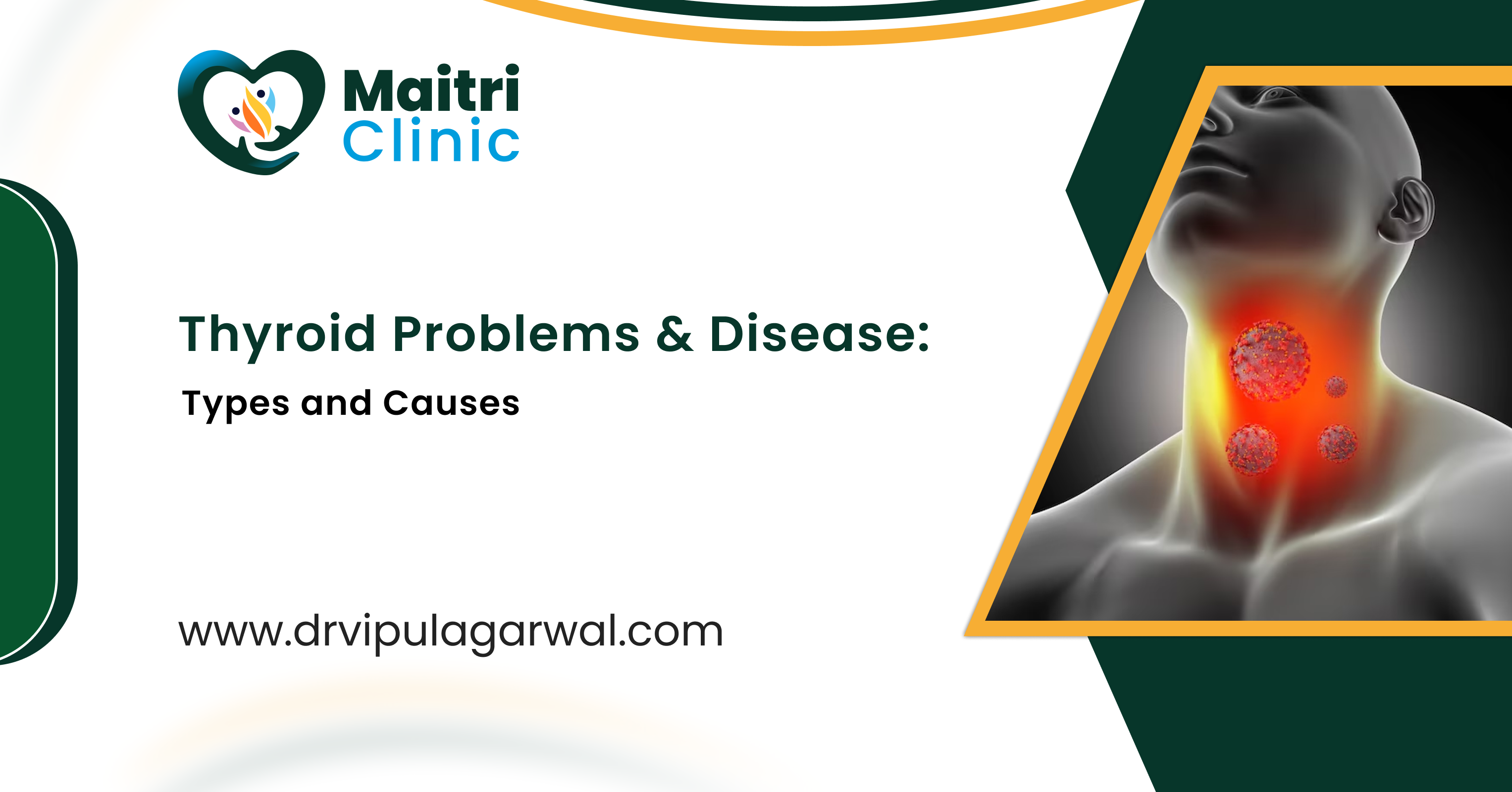

Thyroid Problems & Disease: Types and Causes
Thyroid Problems And Disease: Types and Causes By Dr. Vipul Agarwal (Physician in Jaipur)
The thyroid gland, a small butterfly-shaped gland located in the front of the neck, plays a crucial role in regulating various bodily functions. It produces hormones that control metabolism, growth, and energy levels. However, thyroid problems and diseases can disrupt these functions, leading to a range of health issues. Understanding the types and causes of thyroid problems is essential for effective diagnosis and treatment. When you reach General Physician in Vaishali Nagar Jaipur he will diagnose it and provide the right kind of treatment. But before that we will help you to know about them more!
Types of Thyroid Problems:


Hypothyroidism:
This condition occurs when the thyroid gland doesn’t produce enough thyroid hormone. Symptoms may include fatigue, weight gain, cold intolerance, dry skin, and constipation. The most common cause of hypothyroidism is an autoimmune disorder called Hashimoto’s thyroiditis, where the body’s immune system attacks the thyroid gland.
Hyperthyroidism:
Hyperthyroidism is the opposite of hypothyroidism. It occurs when the thyroid gland produces an excess of thyroid hormone. Symptoms may include weight loss, rapid heartbeat, nervousness, irritability, and heat intolerance. The most common cause of hyperthyroidism is Graves’ disease, another autoimmune disorder where the immune system stimulates the thyroid gland to produce too much hormone.
Thyroid Nodules:
Thyroid nodules are lumps that form within the thyroid gland. While most nodules are benign, some may be cancerous. Thyroid nodules can cause symptoms such as difficulty swallowing, hoarseness, or visible swelling in the neck. The exact cause of thyroid nodules is often unknown, but factors such as iodine deficiency, inflammation, or genetic predisposition may contribute to their development.
Thyroiditis:
Thyroiditis refers to inflammation of the thyroid gland. Infections, autoimmune disorders, or certain medications can cause it. There are several types of thyroiditis, including Hashimoto’s thyroiditis (chronic autoimmune inflammation), subacute thyroiditis (viral infection-induced inflammation), and postpartum thyroiditis (temporary inflammation following childbirth).
Thyroid Cancer:
Thyroid cancer occurs when abnormal cells within the thyroid gland grow and multiply uncontrollably. It may present as a lump or nodule in the neck, but often thyroid cancer causes no symptoms in its early stages. The exact causes of thyroid cancer are not fully understood, but factors such as radiation exposure, family history, and certain genetic mutations may increase the risk.
Causes of Thyroid Problems:


Autoimmune Disorders:
Conditions such as Hashimoto’s thyroiditis and Graves’ disease are autoimmune disorders where the body’s immune system mistakenly attacks the thyroid gland. This leads to inflammation and dysfunction of the gland, causing hypothyroidism or hyperthyroidism, respectively.
Genetic Factors:
Genetics can play a role in predisposing individuals to thyroid problems. Certain genetic mutations may increase the likelihood of developing thyroid disorders such as thyroid cancer or autoimmune thyroid diseases.
Iodine Deficiency:
Iodine is essential for the production of thyroid hormones. An iodine deficiency can lead to thyroid problems, particularly hypothyroidism. While iodine deficiency is rare in many developed countries due to iodized salt and dietary sources, it remains a significant concern in some regions worldwide.
Radiation Exposure:
Exposure to radiation, particularly during childhood, increases the risk of developing thyroid cancer later in life. This radiation exposure may come from medical treatments, such as radiation therapy for cancer, or environmental sources, such as nuclear accidents or fallout.
Gender and Age:
Thyroid problems are more common in women than in men, and the risk increases with age. Women are more prone to autoimmune thyroid diseases, while men are more likely to develop thyroid cancer.
Pregnancy:
Pregnancy-related factors can also contribute to thyroid problems. Postpartum thyroiditis, for example, occurs in some women after giving birth, causing temporary thyroid dysfunction. Additionally, untreated thyroid disorders during pregnancy can pose risks to both the mother and the developing baby.
Reach Dr. Vipul Agarwal General Physician in Vaishali Nagar Jaipur for thyroid treatment!
If you’re seeking expert thyroid disorders treatment in Jaipur, look no further than Dr. Vipul Agarwal, a highly respected general Physician in Vaishali Nagar Jaipur. With a wealth of experience and a commitment to providing personalized care, he specializes in diagnosing and treating thyroid disorders effectively. Whether you’re dealing with hypothyroidism, hyperthyroidism, thyroid nodules, or other thyroid-related issues, he offers comprehensive evaluation and tailored treatment plans to address your specific needs.
FAQ :
Q. What dietary changes can help manage thyroid function?
Ans. Consuming a well-balanced diet rich in iodine, selenium, and zinc can support thyroid health. Incorporate foods like seafood, dairy products, nuts, seeds, and whole grains. Limiting processed foods and reducing intake of goitrogenic foods, such as cabbage and kale, may also be beneficial.
Q. How does exercise contribute to managing thyroid disorders?
Ans. Regular exercise can help boost metabolism and improve overall well-being, essential for managing thyroid disorders. Aim for a combination of aerobic exercises, strength training, and flexibility exercises to support thyroid function and promote overall health.
Q. Are there any lifestyle changes that can alleviate thyroid symptoms?
Ans. Stress management techniques, such as yoga, meditation, deep breathing exercises, and adequate sleep, can help reduce stress levels and alleviate symptoms of thyroid disorders. Maintaining a healthy lifestyle with regular sleep patterns and avoiding excessive alcohol and caffeine consumption can also be beneficial.
Q. What role does medication play in managing thyroid conditions?
Ans. For individuals with hypothyroidism or hyperthyroidism, medication prescribed by a healthcare professional is often necessary to regulate thyroid hormone levels. It’s essential to take prescribed medication as directed and attend regular follow-up appointments to monitor thyroid function and adjust medication dosage if needed.
Q. How can I advocate for my thyroid health with my healthcare provider?
Ans. Be proactive in discussing your symptoms, concerns, and treatment preferences with your healthcare provider. Keep track of your symptoms, medication adherence, and any changes in your condition. Ask questions, seek clarification, and express any challenges you may face in managing your thyroid health to ensure you receive comprehensive care tailored to your needs.